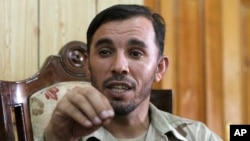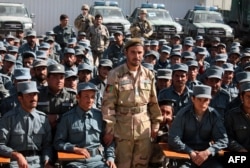Two top officials in southern Afghanistan, including powerful police commander General Abdul Raziq, have been killed in a shooting incident during a visit of the top U.S. general in Afghanistan.
American General Scott Miller was unharmed. He was visiting the Kandahar governor’s compound for a meeting with the governor and other provincial officials. Local media said the participants were making their way to a helipad after the meeting when the shooting occurred.
In addition to Raziq, who had survived several previous Taliban attacks on his life, Thursday’s assault killed the provincial intelligence chief and badly wounded the Kandahar governor. Earlier reports said the governor was killed. Two Americans, including one U.S. service member, were wounded.
The Taliban claimed responsibility, saying an “infiltrator” carried out the attack that was aimed at both Raziq and the American general.
U.S. military spokesman Col. Dave Butler said the wounded Americans “have been medically evacuated and are stable,” adding that the attacker is dead and the area is secure.
“This was an Afghan-on-Afghan incident,” he said, suggesting it was an insider attack in which Afghan personnel turn their guns on local partners.
Butler later tweeted a message from General Miller, saying “Today I lost a great friend Lt. Gen. Raziq. We had served together for many years. Afghanistan lost a patriot, my condolences to the people of Afghanistan. The good he did for Afghanistan and the Afghan people cannot be undone.”
Afghan President Ashraf Ghani, in a video address to the nation, told Afghans the situation in Kandahar would soon return to normal.
U.S. Secretary of State Mike Pompeo said in a statement late Thursday.
“The United States is resolved to continue its support for the government and people of Afghanistan as they work to provide security for all Afghan citizens.” He added that Raziq’s assassination and recent attacks on Afghan parliamentary candidates “stand in stark contrast to the aspirations of the Afghan people for peace, security, and economic stability.”
Raziq’s assassination is a major blow to counter-Taliban efforts in Kandahar, where the U.S. military operates the second largest base in the country.
Raziq had been the police chief for Kandahar province since 2011 and was known to have kept the Taliban at bay. A New York Times story in 2014 called him the man who put “Fear in Taliban and Their Enemies.”
At the same time, human rights activists blamed his security forces for widespread abuses.
The United Nations Committee against Torture in a report last year noted “numerous and credible allegations” that Raziq was “widely suspected of complicity, if not of personal implication, in severe human rights abuses, including extrajudicial killings and … secret detention centers.” The committee called for Raziq and other Afghans involved in such practices be duly prosecuted and punished.
In one of its recent reports, the Human Rights Watch observed that “even the Ghani administration seems afraid of Raziq, who operates far outside the law and has powerful support, notably from U.S. intelligence and security officials, who consider him an ally in the fight against the Taliban.”
By many accounts, Raziq was one of the most powerful and rich men in southern Afghanistan. His death, analysts say, could change the political landscape.
“It’s going to have a significant impact on the whole security balance in southern Afghanistan, but particularly Kandahar,” said Mushtaq Rahim, an independent political analyst based in Kabul. “He was able to maintain the security presence of the Afghan government on the outskirts of the city and even in faraway areas.”
In general, in Afghanistan, the rural areas outside the city are considered to be much harder to secure and many of them are under Taliban influence or control.
Ayaz Gul contributed to this report.





